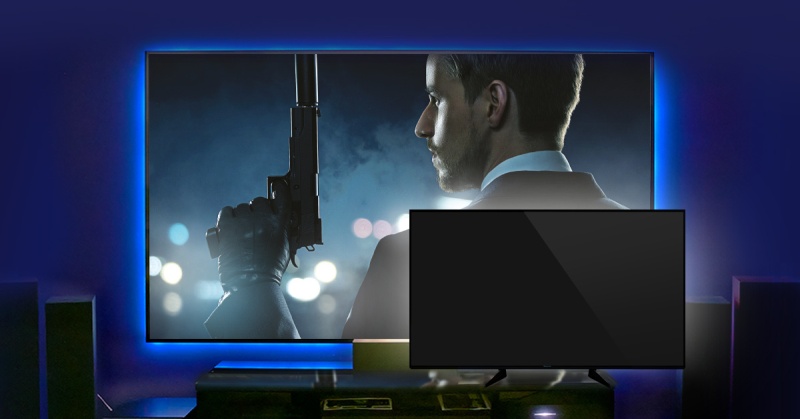
What Feasts Your Eyes: Projector vs TV
A screen is part of every home. It is like the missing piece of the puzzle that just needs to be there. This piece completes your living space. It is not only a screen that permits you contact with the wide world of actuality and imagination, but an aesthetic piece that completes the interior. There was a time when TV was the only option to enjoy your cable deals. Big screens appeared to form a mini home cinema or theatre. The past few years have seen all that change. This change is promising and adds an option. The last few years have seen home theater projectors becoming affordable. Not only that, their picture quality i.e. vivid colors, and sharpness has significantly improved, making them a viable alternative to a TV. TV, on the other hand, competes with the ever-enhanced picture quality. With 4K resolution answering these picture quality questions, the smart TV has also come to minimize the need for multiple devices. Looking for the best TV for your bright room? Check here.
But all this choice also raises one crucial question for avid TV watchers. What will feast their eyes with entertainment the best? This guide will help you answer this query. Read on to make the most of the money you intend to spend.
Size, visual, and more
Here are a few things you need to consider before reaching a decision. These are bound to help you form a perspective and delve into details that you may miss otherwise.
Size
There was once a time when TVs were ages behind projectors in terms of size. TVs may not have won this race yet but the gap has been bridged to an extent. An 85-inch TV can be bought for around $4000. Projector screens can provide solid brightness, sharp colors, and a 100-120 inch screen size is around $1400. This makes the projector offer a better size at a cost significantly less than a high-end 4K UHD TV. The gap has grown smaller, but projectors still win this race of size.
Brightness

Brightness is a concern with projectors. It will directly depend upon the darkness in the room. More light will mean you’ll need more brightness to ensure the picture isn’t washed out. High brightness projectors hike up the cost. Projectors in the $2000 range produce 1500-3000 lumens. As the image hits your eye, the number is bound to go down. TV on the other hand, at a similar price, is capable of producing higher luminance. A good projector struggles to produce the same luminance as an ordinary TV. To make matters worse, the bulb dims over time ultimately burning out making it a costly replacement.
But there’s another side to it too. The mild light is easy on the eyes. Ever noticed your eyes don’t feel stressed after watching a movie in a cinema? That’s the projector effect.
Yet, at the end of the day, brightness plays an important part in picture quality. You will want bright and vibrant pictures. You will not always want to watch the screen in dim light or complete darkness.
Contrast
A combination of back levels and brightness determines the contrast. We know that a projector’s brightness can be gauged by its lumen ratings. The darks aren’t as simple to determine though. They are not independent rather rely upon the level of darkness in your projection room. Flashy lights can damage the TV contrast as well but they are better equipped to fight this battle. Projectors are not quite capable of doing so and will be in trouble.
Resolution
Wide color gamut and high dynamic range are expensive in premium 4K TVs. In simple words, we are talking about contrasts and brightness again. We know high-performance TVs are expensive. What about 4K HDR projectors? You can get a 4K TV and a sound system or an Ultra HD Blu-ray player in the same price as a 4K HDR projector. Expensive, real expensive. That is what you are thinking right now. A budget 4K projector may cost you around $2000 but it can never reach the same resolution as an equally priced TV.
Color Accuracy

Not all projectors will cost you a great deal to get decent colors. All you have to do is to get the right type of projector and you will have a fairly priced projector with colors you like. TVs on the other hand, require a greater effort with more processing to get the same result. That’s more parts and processes which means the price goes up. 4K TVs can produce better color gamut than ordinary projectors but the difference is not as much. Who knows a few years down the line we may see similar results with projectors?
You can invest in a projector room, control light and get a larger image with tremendous picture quality. The difference here doesn’t seem to be much and both the technologies are hard to dissect. Another angle to look at the two options is however price versus performance. And this view does tilt the balance in favor of TVs.
Sound
Have you ever seen a projector? A speaker in that size? Nope. TV is the better choice in this regard. Why? It comes with an actual speaker. Occasionally they are decent as well. Whereas with projectors, you will almost have to buy external speakers. The ones that do have a speaker have it in the wrong place. Then they are so small the sound produced is good for nothing. TV speakers are debatable but they serve the purpose. Far better than the ones that come with a projector.
Buying external speakers is definitely an option but you may not want to spend a lot of money on a visual device only to find out that getting an audio system is mandatory. This spirals the cost upwards and asks for extra space as well.
Wrap up!
Projector versus TV is a debate that has commenced in recent times only. Projectors have become affordable but their color and sharpness is still something that needs improvement. TV, on the other hand, lacks in size but makes up for in the rest of the areas. Projectors can also be costly, especially when the aim is to get audio-visual quality similar to a TV.
Thus the winner in this fight so far looks to be TV.




